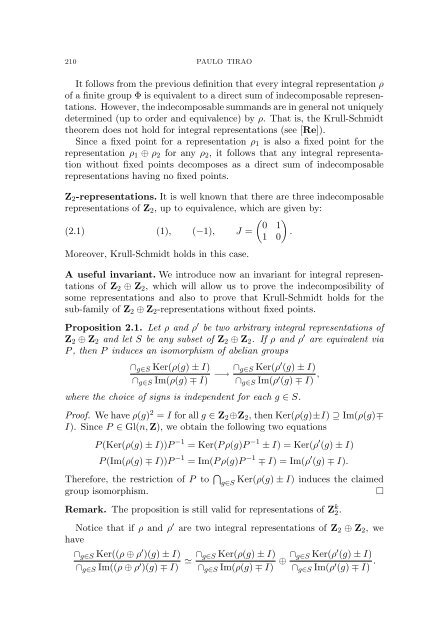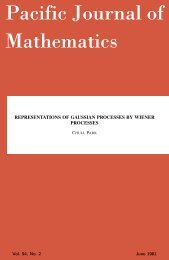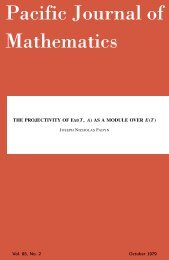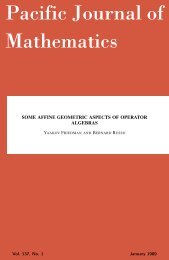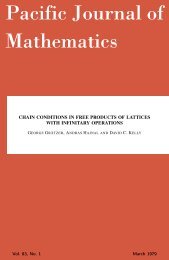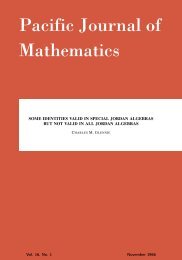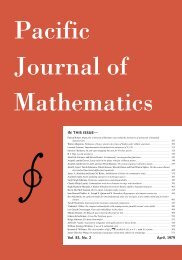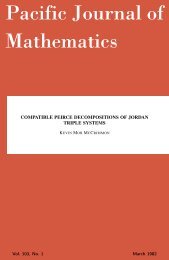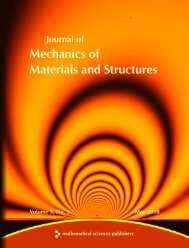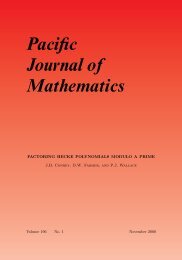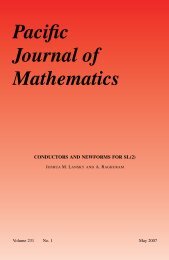For printing - MSP
For printing - MSP
For printing - MSP
You also want an ePaper? Increase the reach of your titles
YUMPU automatically turns print PDFs into web optimized ePapers that Google loves.
210 PAULO TIRAO<br />
It follows from the previous definition that every integral representation ρ<br />
of a finite group Φ is equivalent to a direct sum of indecomposable representations.<br />
However, the indecomposable summands are in general not uniquely<br />
determined (up to order and equivalence) by ρ. That is, the Krull-Schmidt<br />
theorem does not hold for integral representations (see [Re]).<br />
Since a fixed point for a representation ρ1 is also a fixed point for the<br />
representation ρ1 ⊕ ρ2 for any ρ2, it follows that any integral representation<br />
without fixed points decomposes as a direct sum of indecomposable<br />
representations having no fixed points.<br />
Z2-representations. It is well known that there are three indecomposable<br />
representations of Z2, up to equivalence, which are given by:<br />
<br />
0 1<br />
(2.1)<br />
(1), (−1), J = .<br />
1 0<br />
Moreover, Krull-Schmidt holds in this case.<br />
A useful invariant. We introduce now an invariant for integral representations<br />
of Z2 ⊕ Z2, which will allow us to prove the indecomposibility of<br />
some representations and also to prove that Krull-Schmidt holds for the<br />
sub-family of Z2 ⊕ Z2-representations without fixed points.<br />
Proposition 2.1. Let ρ and ρ ′ be two arbitrary integral representations of<br />
Z2 ⊕ Z2 and let S be any subset of Z2 ⊕ Z2. If ρ and ρ ′ are equivalent via<br />
P , then P induces an isomorphism of abelian groups<br />
∩g∈S Ker(ρ(g) ± I)<br />
∩g∈S Im(ρ(g) ∓ I) −→ ∩g∈S Ker(ρ ′ (g) ± I)<br />
∩g∈S Im(ρ ′ (g) ∓ I) ,<br />
where the choice of signs is independent for each g ∈ S.<br />
Proof. We have ρ(g) 2 = I for all g ∈ Z2⊕Z2, then Ker(ρ(g)±I) ⊇ Im(ρ(g)∓<br />
I). Since P ∈ Gl(n, Z), we obtain the following two equations<br />
P (Ker(ρ(g) ± I))P −1 = Ker(P ρ(g)P −1 ± I) = Ker(ρ ′ (g) ± I)<br />
P (Im(ρ(g) ∓ I))P −1 = Im(P ρ(g)P −1 ∓ I) = Im(ρ ′ (g) ∓ I).<br />
Therefore, the restriction of P to <br />
g∈S Ker(ρ(g) ± I) induces the claimed<br />
group isomorphism. <br />
Remark. The proposition is still valid for representations of Z k 2 .<br />
Notice that if ρ and ρ ′ are two integral representations of Z2 ⊕ Z2, we<br />
have<br />
∩g∈S Ker((ρ ⊕ ρ ′ )(g) ± I)<br />
∩g∈S Im((ρ ⊕ ρ ′ )(g) ∓ I) ∩g∈S Ker(ρ(g) ± I)<br />
∩g∈S Im(ρ(g) ∓ I) ⊕ ∩g∈S Ker(ρ ′ (g) ± I)<br />
∩g∈S Im(ρ ′ (g) ∓ I) .


